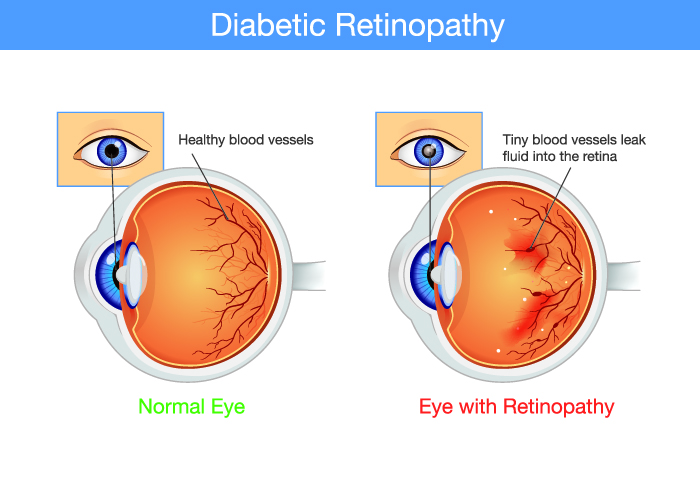Retinal Detachment Treatment & Diagnostics in Chembur, Mumbai
Retinal Detachment
The retina is a thin membrane located at the back of the eye and plays a vital role in vision. When light falls on the eye, the lens projects an image of the object in front of the retina. The retina is responsible for converting that image into biochemical signals to the brain. Thus, the retina along with other parts of the eye help in ensuring normal vision.

What do we need to know about retinal detachment?
Retinal detachment occurs when the retina is separated from the back of the eye. This thin tissue may be partially or fully pulled off which can be very fatal for vision. This detachment deprives the retina severely of oxygen and leads to loss of vision. People who experience sudden vision changes should immediately seek medical help.
To seek treatment, you can search for a retinal detachment specialist near you or you can visit an ophthalmology hospital in Mumbai.
What are the types of retinal detachment?
Three types of retinal detachment are there which include:
- Rhegmatogenous Retinal Detachment – In this type of retinal detachment, a tear or hole occurs in the retina due to which the fluid from the eye slips to the back of the retina. This separates the retina from the retinal pigment, epithelium, which is the membrane that provides oxygen to the retina. It is the most common type of retinal detachment.
If it is left untreated, the fluid may keep passing through the hole and may lead to retinal detachment and loss of vision. - Tractional Retinal Detachment - In this type of detachment, the scar tissue grows on the retina causing the retina to get separated from the back of the eye. It is less common and is usually seen in people with diabetes mellitus.
- Exudative Detachment - This type of retinal detachment does not occur due to tear or hole in the retina. It occurs due to any inflammatory disorder leading to fluid accumulation behind the eye or cancer behind the retina.
What are the symptoms of retinal detachment?
There is no pain associated with retinal detachment but you may experience certain symptoms which include:
- Blurred vision in the affected eye
- Flashes of light on looking at the sides
- Partial vision loss as if a curtain has been pulled in front of your field of vision
- Suddenly seeing floaters, which appear as strings floating in front of your eyes
These are the warning signs before it becomes fatal. If left untreated, this condition can lead to permanent vision loss.
When do you need to see a doctor?
If you experience any of the signs and symptoms, you should immediately consult a doctor. This condition can result in a permanent loss of vision if not treated on time.
You can request an appointment at Apollo Spectra Hospitals, Chembur, Mumbai.
Call 1860 500 2244 to book an appointment.
What are the risk factors for retinal detachment?
There are several risk factors which lead to retinal detachment. They include:
- People over 40 years of age are at higher risk of getting retinal detachment
- A family history of retinal detachment
- Extreme nearsightedness
- Diabetes mellitus
- Posterior vitreous detachment which is common in people above 60
- An eye surgery such as cataract removal
- Trauma to the eye
How is retinal detachment treated?
Generally, a surgery is required to repair the detached retina. But minor tears or detachment are treated by simple procedures like:
- Photocoagulation - It is performed when there is a hole or tear in your retina but it is still attached. In this case, a laser is used to burn around the site of the tear which fixes the retina back.
- Retinopexy - This again is done in the case of minor detachment where the doctor puts a gas bubble in your eye which in turn causes the retina to move back to its place.
- Cryopexy - In this case, the doctor uses freezing with intense cold to fix the detached retina back.
In case of a severe tear, vitrectomy is performed which involves anesthesia and surgery.
Conclusion
Retinal detachment generally resolves after surgery or on getting treatment. However, in some cases, vision is not regained completely which mostly happens if treatment is not sought on time. Also, protecting your eyes by wearing protective eyewear and taking regular eye exams can greatly reduce the risks of developing it.
No, the other eye can only get it if it suffers any serious injury or tear.
Only surgery or a treatment procedure can cure it, otherwise it might cause permanent vision loss.
The minimum waiting period prior to surgery is around 4.2 weeks and it should not be delayed any longer.
Our Doctors
DR. NEETA SHARMA
MBBS, DO (Ophthal), ...
| Experience | : | 31 Yeras Experience |
|---|---|---|
| Speciality | : | Ophthalmology... | Location | : | Chembur |
| Timings | : | Thur, Fri : 10:00 AM... |
DR. PALLAVI BIPTE
MBBS, MS (Ophthalmol...
| Experience | : | 21 Yeras Experience |
|---|---|---|
| Speciality | : | Ophthalmology... | Location | : | Chembur |
| Timings | : | Mon - Wed, Fri & Sat... |
DR. NUSRAT BUKHARI
MBBS, DOMS, Fellowsh...
| Experience | : | 12 Yeras Experience |
|---|---|---|
| Speciality | : | Ophthalmology... | Location | : | Tardeo |
| Timings | : | Mon - Fri : 9:00 AM ... |
Treatments
Our Top Specialities
NOTICE BOARD
CONTACT US
CONTACT US
 Book Appointment
Book Appointment





.svg)
.svg)
.svg)
.svg)








